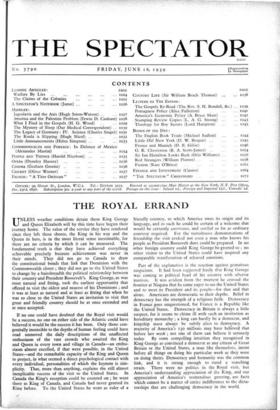THE ROYAL ERRAND
UNLESS weather conditions detain them King George and Queen Elizabeth will by this time have begun their journey home. The value of the service they have rendered since they left these shores, the King in his way and the Queen in hers, is in the most literal sense inestimable, for there are no criteria by which it can be measured. The fundamental truth is that they have achieved everything achievable precisely because achievement was never in their minds. They did not go to Canada to draw the constitutional bonds that link that Dominion with the Commonwealth closer ; they did not go to the United States to change by a hairsbreadth the political relationship between their country and President Roosevelt's. King George, as was most natural and fitting, took the earliest opportunity that offered to visit the oldest and nearest of his Dominions ; and it was at least as natural and at least as fitting that when he was so dose to the United States an invitation to visit that great and friendly country should be at once extended and at once accepted.
If no one could have doubted that the Royal visit would be a success, no one on either side of the Atlantic could have believed it would be the success it has been. Only those con- genitally insensible to the depths of human feeling could have read unmoved the daily descriptions of the unaffected enthusiasm of the vast crowds who awaited the King and Queen in every town and village in Canada—an enthu- siasm almost excelled, if that were possible, in the United States—and the remarkable capacity of the King and Queen to project, in what seemed a direct psychological contact with every individual, personalities of which the keynote is sim- plicity. That, more than anything, explains the still almost inexplicable success of the visit to the United States. In Canada the King's reception could be counted on ; he went there as King of Canada, and Canada had never greeted its King before. To the United States he went as ruler of a friendly country, to which America owes its origin and its language, and as such he could be certain of a welcome that would be certainly courteous, and cordial so far as ordinary courtesy required. For the tumultuous demonstrations of friendship the visit evoked not even a man who knows his people as President Roosevelt does could be prepared. In no other foreign country could King George be greeted so ; no other visitor to the United States could have inspired any comparable manifestation of released emotions.
Part of the explanation is the reaction against gratuitous suspicions. It had been suggested freely that King George was coming as political head of his country with ulterior motives. It was evident from the moment he crossed the frontier at Niagara that he came eager to see the United States and to meet its President and its people—for that and that alone. Americans are democratic to their depths. Belief in democracy has the strength of a religious faith. Democracy in France goes unquestioned, for France is a Republic like the United States. Democracy in Britain is always a little suspect, for it seems to chime ill with such an institution as hereditary monarchy ; a king can hardly be a democrat, and kingship must always be subtly alien to democracy. A majority of America's 13o millions may have believed that before last week ; not one of them can believe it seriously today. By some compelling intuition they recognised in King George as convinced a democrat as any citizen of Great Britain or the United States, a man like themselves, intent before all things on doing his particular work as they were on doing theirs. Democracy and humanity was the common link, and it is strong enough to stand a searching strain. There were no politics in the Royal visit, but America's understanding appreciation of the King, and our appreciation of America's tremendous greeting, are facts which cannot be a matter of entire indifference to the dicta- torships that are challenging democracy in the world.






















































